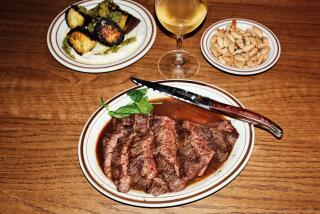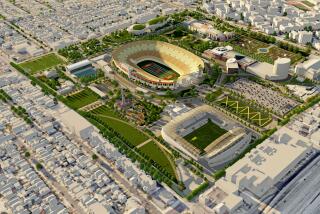A front seat on the new Echo Park
There are two ways to read the giant neon sign in front of Neil Stone’s Echo Park furniture store. And either way is fine with him, so long as it draws attention.
Spanish speakers see the letters and read La Popular and expect well-made, no-frills bargains from a store that is part of a Southern California franchise that is familiar among Latinos.
English speakers read L.A. Popular and might be drawn inside by boutique-like pieces at budget prices.
Such are the hopes of Stone, the third-generation owner of La Popular, a 60-year-old, family-operated furniture store that depends on finding a way to reconcile the old Echo Park with the emerging neighborhood.
From Sunset Boulevard and Alvarado Street, Stone and his family have long had a storefront view on the swiftly changing demographics that have transformed so many Los Angeles neighborhoods. They have realized over the decades that success is linked to how well they know their neighbors.
In the 1940s, his grandfather Stanley launched the Echo Park outlet known as Stone Bros. and catered to a heavily Jewish clientele.
When his father took over in the 1970s, Latinos had begun to pour into store, shopping for coffee tables and television sets. The trend carried on a decade later when Neil Stone stepped in. He dropped the Stone Bros. name and adopted La Popular, The Popular One in Spanish.
Today, Stone is adjusting for a third round of change: gentrification and the rising rents, new construction and new money it has brought to Echo Park. Already, American Apparel, Starbucks, a wine bar, a vegan restaurant and several coffee shops have arrived on his block. Soon, live theater may open.
In the last 14 years, Jose Sigala has seen the neighborhood go from mostly Latino families to younger, hipper singles. The change is reflected in schools, property values and in local stores, said Sigala, the president of the Greater Echo Park Elysian Neighborhood Council.
“The biggest indication of the demographic change can be seen along Sunset and Echo Park, where businesses have been catering to the newly established clientele,” he said.
For the Stones, each new wave has come with universal needs: beds, couches and dining room tables.
But being wedged between the old and the new has not been easy, especially during a recession. In the last year, he cut his staff by two-thirds. He is also leasing a portion of the 16,000-square-foot building to earn extra money. And he worries that his loyal clientele of the 1980s and ‘90s will shun him if he chases new waves of residents too aggressively.
Yet he has decided to play English soft rock over the sound system instead of the usual Spanish love songs.
“I’m not abandoning the Latino market,” Stone, 50, said. “I just don’t want to put all my eggs there. I’m trying to do both.”
In the packed display room, the changes are clear.
Latino customers have declined from about 90% to less than half. College students and actors transplanted from Chicago, Boston and New York stroll in as often as laborers from Central America and Mexico.
Longtime customer Jose Sandoval, 48, did not notice the differences in the store as he visited on a recent Friday.
“Everything here is good,” he said, looking around. “I like the service and the quality I get compared to Sears and La Curacao.”
Sleek, contemporary pieces in neutral colors have begun to outnumber bulky couch sets with floral patterns and carved wood touches. Marble, ornate iron and tassels are less in demand.
This month, Stone began to advertise in Los Feliz and Silver Lake, areas he never touched when his focus was on Spanish television and radio. An English-speaking salesman may soon join the ranks, which now include workers who deal better in Spanish than English.
On a recent Friday morning, La Popular’s salesman of 23 years, A. Joaquin Plazaola, tried his best to work the showroom as two young Asian women, one of whom was in scrubs, approached a leather bed.
“For $495, it’s yours,” the Nicaraguan said in accented English.
Timidly, they smiled and shook their heads no.
“We’re going to look around.”
Plazaola followed them closely, though he knew they weren’t his customers. They were Stone’s; nowadays he is a leading salesman because he is able to negotiate in clear English.
In the last two years, the store has attracted more non-Latino customers, Plazaola said. “They’re not so comfortable with me, I think. They rather talk to people like themselves, just like Latinos rather talk to me. So if I see they want to buy, I go get Neil.”
The new neighborhood dynamic keeps Stone busy, moving back and forth from the sales floor to the phone, much different from the days when he kept his distance as an office administrator.
He sometimes wonders how his father and grandfather, who have both died, weathered the changes when they were running the store. He expects his children will move on to other careers and that this might be the last transformation the Stone family lives through.
“It’s exciting. It’s challenging,” he said.
“I’m hopeful it will work out for everybody.”
--
More to Read
Inside the business of entertainment
The Wide Shot brings you news, analysis and insights on everything from streaming wars to production — and what it all means for the future.
You may occasionally receive promotional content from the Los Angeles Times.











